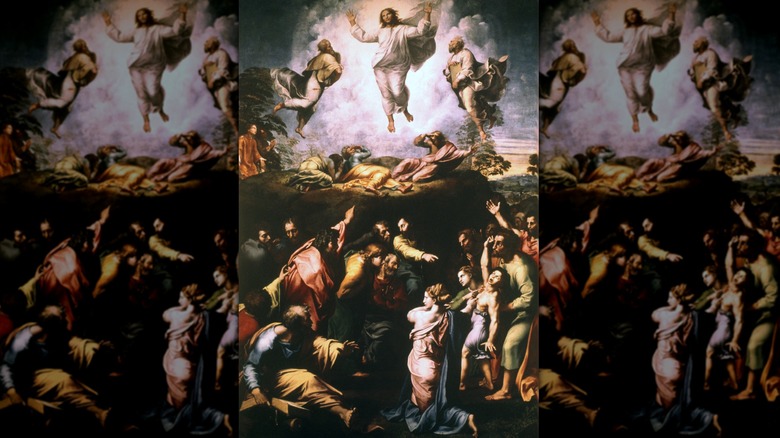The Only Times God Ever Speaks Aloud To Jesus In The Bible
The Bible may not be the literal word of God — there's a solid paper trail for its long, complicated, and human-driven assembly — but it is full of dialogue from the man upstairs. God directly admonishes Adam and Eve, gives building orders to Noah, granted wisdom to Solomon, and it's written that he "[speaks] to Moses face to face, as one speaks to a friend" per Exodus 33:11 (via Bible Gateway). The uniquely intimate relationship between God and Moses signified by those conversations is remarked upon when Moses dies; no other prophet, it is said, has ever had such communication with the Lord.
It's curious, then, why there is so much more dialogue between them than between God and his only son. Direct, audible interactions with God may have plenty of representation in the Old Testament, but it's still more common for God's will to appear via signs, portents, or angelic messengers. And that makes a certain sense when the recipients of these messages are mortal. But it seems strange that, in all of the gospels, God speaks directly to Jesus Christ just three times.
The first instance is recorded in Matthew 3 and Mark 1, and it happens when Jesus encounters John the Baptist. Matthew says that John tried to refuse, that he felt Jesus must baptize him; Mark doesn't record any objection. But either way, once Jesus was baptized, God's voice sounded, per Mark: "You are my Son, whom I love; with you I am well pleased." In Matthew, God speaks about Jesus rather than to him, but the line is otherwise the same.
God speaks during the transfiguration
After his baptism, Jesus goes a long time in the gospels without any direct communication between himself and God. Being the messiah of Christian thought, fully human and fully divine, perhaps that's not as strange as it appears at first glance; Jesus is there to speak the word of God, after all. And if anyone among Jesus's disciples harbored any doubt over that point, God himself corrected them the next time he spoke around Jesus.
In Matthew, Mark, and Luke, a handful of disciples bear witness to the transfiguration, the brief revelation of divine radiance from Jesus. He shines as bright as the sun and converses with both Moses and Elijah. Seeing this, Peter suggests building three shrines, one for each of the figures, but before he can finish his thought, God's voice calls out, per Matthew: "This is my Son, whom I love; with him I am well pleased. Listen to him!" The same moment appears in all three of the gospels to recount the incident, with trivial variations in the wording of God's line.
The disciples fall down in terror at God's words, but Jesus tells them not to be afraid, only to keep the transfiguration to themselves until his death and resurrection. God's admonition can be difficult to understand at first pass, but the thrust of it is that Peter was not wrong to feel awe and worship, only in wanting to commemorate the transfiguration before it was meant to be widely known. In proposing three shrines instead of one, he also elevated Moses and Elijah too high; they weren't peers of Jesus.
God speaks to Jesus before the crucifixion
The gospel of John doesn't recount the word of God after the baptism of Jesus nor after his transfiguration. It's just one of the areas that sets John, the last of the gospels, apart from its fellow books. But if John is mum on the first two times God speaks to or around Jesus, it is the only source we have for the third time: in response to Jesus before he is betrayed and crucified.
It is, to be sure, an indirect message, and aimed at those in Jesus's company more than Jesus himself. In John 12, after granting an audience with some Greeks, Jesus predicts his own death. He insists upon his sacrifice's necessity. But he confesses: "Now my soul is troubled, and what shall I say? 'Father, save me from this hour?'" Jesus answers his own question, saying that he cannot and would not be spared. To underline the point, a voice comes down from heaven: "I have glorified it, and will glorify it again." This voice is taken by some in the crowd to be that of an angel, and by others to be the sound of thunder. But Jesus implies that the voice was from God, to reassure those with him of what was to come.


